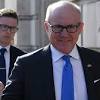Trump agrees to give a victim interview to the FBI after assassination ...

WASHINGTON — Former President Donald Trump has agreed to participate in a victim interview with the FBI focused on his attempted assassination, a bureau official told reporters Monday.
The interview with Trump would be consistent with any interview the bureau would conduct for any victim of crime under any circumstances, an official said.
The FBI investigation has found that attempted assassin Thomas Matthew Crooks was a "highly intelligent" man as well as "a loner" with few friends and acquaintances outside of his family, and had a growing interest in weapons.
His motive is still not known. The FBI has conducted hundreds of interviews and requested information about his online accounts, including gaming accounts, from dozens of companies, an official said. His search history included seeking information about the attempted assassination of Slovak Prime Minister Robert Fico earlier this year, as well as mass shootings and power plants, an official said. Last week, the FBI revealed that Crooks had searched "how far away was Oswald from Kennedy?" about the assassination of former President John F. Kennedy by Lee Harvey Oswald, about a week before the attack.

The FBI found that the ladder Crooks purchased before the shooting was not taken to the Trump rally, though officials found a bloodied receipt for it on his body. Crooks did appear to have used a drone ahead of the attack, although no recorded footage was found on the drone, the FBI said.
Crooks fired off eight rounds just 25-30 seconds after a local police officer attempted to confront him on the roof. As NBC News has previously reported, citing the FBI and law enforcement, the officer was boosted up above the roof line by a colleague and Crooks pointed his weapon at the officer just before firing.
Crooks appeared to have carefully planned the attack ahead of the campaign rally and worked to keep his plans quiet, an official said during a briefing for reporters Monday, more than two weeks after the July 13 attempt on Trump's life.
FBI Deputy Director Paul Abbate said Monday that the bureau had been working around the clock on the investigation and that while the bureau typically does not share regular updates about ongoing investigations, FBI officials felt doing so here was important for the American public.
U.S. Secret Service Director Kimberly Cheatle resigned last week in the wake of the attack and after a contentious House hearing about the attempt. The Senate will conduct its own hearing this week with the FBI and Department of Homeland Security.
Abbate said the bureau was collecting facts but was not focused on identifying failures by law enforcement that day, saying that type of analysis was better left to others.
“The entirety of the FBI is committed to uncovering the real facts, the truth about this attack on former President Trump and the murder of Mr. Comperatore and the injury to others as well,” Abbate said, referring to Corey Comperatore, a rallygoer who was killed in the attack. Two others were wounded.
FBI Director Christopher Wray told Congress last week that “there’s some question about whether or not it’s a bullet or shrapnel” that hit Trump’s ear during the assassination attempt, adding fuel to conspiracy theories about the shooting.
FBI Agent Kevin Rojek, who runs the Pittsburgh office, said Monday that Trump was struck with a bullet, whether it be a whole or fragmented bullet, echoing a statement from the bureau issued Friday after Wray’s congressional testimony.
Rojek said that Crooks appeared to have "made significant efforts to conceal his activities."
Rojek said Crooks appeared to be "a loner," and another official said there was no indication that Crooks had any mental health treatment or institutionalization.
The FBI has had difficulty getting into some of Crooks' accounts because of his use of encrypted apps, a bureau official said.
"Encryption has been a challenge for us here in this investigation," said FBI official Bobby Wells.

Ryan J. Reilly is a justice reporter for NBC News.
Ken Dilanian contributed.


 United States
United States Argentina
Argentina  Australia
Australia  Austria
Austria  Brazil
Brazil  Canada
Canada  Chile
Chile  Czechia
Czechia  France
France  Germany
Germany  Greece
Greece  Italy
Italy  Mexico
Mexico  New Zealand
New Zealand  Nigeria
Nigeria  Norway
Norway  Poland
Poland  Portugal
Portugal  Sweden
Sweden  Switzerland
Switzerland  United Kingdom
United Kingdom 




